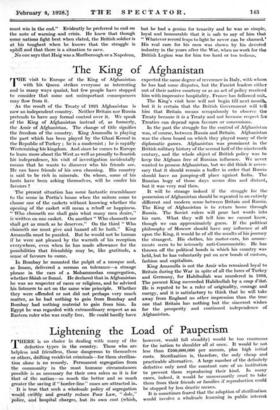The King of Afghanistan
THE visit to Europe Of the King of Afghanistan I with his Queen strikes everyone as interesting and in many ways quaint, but few people have stopped to consider that some not unimportant consequences may flow from it AS the -result of the Treaty of 1921 Afghanistan is now an independent country: Neither Britain nor RUsSia pretends to have any formal control over it We speak of the King of Afghanistan instead of, as formerly, the Amir of Afghanistan. The change of title signifies the freedom Of the country. King Amanulla is playing the part which has been played by the Ghazi Kemal in the Republic of Turkey ; he is a modernist ; he is rapidly Westernizing his kingdorii. And since he comes to EurOpe to learn more about the West as well as proudly to flourish his independence, his visit of investigation incidentally Means that he wants to • discoVer *rho his friends are. He can have friends of his own choosing. His country is said to be rich in minerals. On whom, some of his hosts have been asking themselves, will he confer his favours ?
The • present situation has some fantastic resemblance to the scene 'in Portia's house when the suitors come to Choose one of the caskets without knowing whether the oPening of the casket will mean a rebuff or happiness.
Who chooseth me shall gain *hat many men desire," is written on one casket On another " Who chooseth me shall get as much as he deserves." On the third " Who CliOoieth me must give and hazard all he hath." King Ainanulla must be puizled. But he would not be human if he were hot pleased by the warmth of his reception everywhere, even when he has made allowance for the possibilities that friendship may , be, like gratitude, a sense of favours to come.
In Bombay he mounted the pulpit of a mosque and, as Imam, delivered a sermon on tolerance—a strange phrase in the ears of a Mohammedan congregation, whether Shiah or Sunni. He declared that in Afghanistan he was no respecter of races or religions, and he advised his listeners to act on the same wise principle. Whether they were .offended or not did not perhaps very much matter, as he had nothing to gain from Bombay and BoMbay had nothing material to gain from him. In Egypt he was regarded with extraordinary respect as an Eastern ruler who was really free. He could hardly have expected the same degree of reverence in Italy, with whom he has had some disputes, but the Fascist leaders either out of their native courtesy or as an act of policy received him with impressive hospitality. France has followed suit.
The King's visit here will not begin till next month. but it is certain that the British Government will tell him that Britain means scrupulously to observe the Treaty because it is a Treaty and not because respect for Treaties can depend upon favours or concessions.
In the past the struggle for the control of Afghanistan was, of course, between Russia and Britain. Afghanistan was the chess board on which they played many of their diplomatic games. Afghanistan was prominent in the British military history of the second half of the nineteenth century, and the whole object of British policy was to keep the Afghans free of Russian influence. We never wanted to possess Afghanistan, but we did think it neces- sary that it should remain a buffer in order that Russia should have no jumping-off place against India. The Russian bogy of those days seems dim and distant, but it was very real then.
It will be strange indeed if the struggle for the possession of Afghanistan should be repeated in an entirely different and modern sense between Britain and Russia. The King of Afghanistan is to return home through Russia. The Soviet rulers will pour last words into his ears. What they will tell him we cannot know, though we can approximately guess. If the political philosophy of Moscow should have any influence at all upon the King, it would be of all the results of his journey the strangest; His clothes, his motor-cars, his amuse- ments seem to be intensely anti-Communistic. He has thrown off the political bonds in which his country was held, but he has voluntarily put on new bonds of custom, fashion and capitalism.
King Amanulla is not the Amir who remained loyal to Britain during the War in spite of all the lures of Turkey and Germany, for Habibullah was murdered in 1919. The present King succeeded Habibullah by a coup d'itat. He is reputed to be a ruler of originality, courage and energy, and it is satisfactory to think that he will take away from England no other impression than the true one that Britain has nothing but the sincerest wishes for the prosperity and continued independence of Afghanistan.






































 Previous page
Previous page